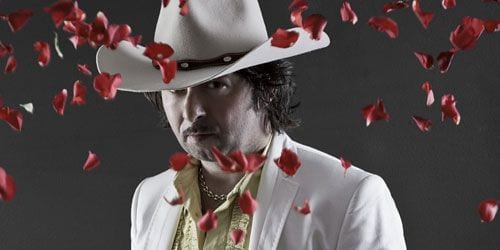
At the Eurovision song contest in 2002, the small Central European country of Slovenia was represented by three men wearing glittering bright red airline stewardess outfits and pairs of brilliant immaculate clean white gloves that shone and gleamed under the stage lights like yacht sails on a sunny day. I can offer you only love, they sang. I know you feel the same. Afterwards, there were protests in the streets of the Slovenian capital, Ljubljana, and certain Slovenian politicians called for the group to be removed from the competition. The European Parliament, seeing this public display of anti-homosexual sentiment, wondered if the country should be admitted to the Union at all.
The group was called Sestre or Sisters. The lyrics were written by Barbara Pešut, and the music by Robert Pešut, her husband, also known as Magnifico, a man whose career had been built on musical ability and social provocation. He was, and is, a court jester, a tease, who mocks the idea of hyper-masculinity and similar extremes — the sort of provocateur who works best when he has walls of public decency to push against. In the publicity photographs for this album, he plays with the idea of seduction, standing in front of you with slicked hair, a white suit, a defective copse of hopeful flowers, the eyes peeking out from under the hat to see if you’re buying it, a rumpled nightclub satyr, the macho stud as a doleful persistent clown.
This sensibility bounces off pop music’s candied grandeur, its earnestness, the crescendos, the vows of devotion and love, or the cries of defiance, those dramatic mini-arias. That candor can be undercut. Singing to a female you, he carries a declaration of possessive love to its farthest conclusion when he threatens to make you his bride or else kill you. “Kill, kill”, he sings. “Trust on me, I will”. A Spaghetti Western surfer twang in “Land of Champions” is a prelude to his voice purring with apparent seriousness, “There was a land. A land of champions. A land called … Yugoslavia“. The pause is crucial. A chorus of full-voiced men surges up like a Russian choir, pushing the joke further. “There was a land of champions”, he exclaims. Another joke: the song is a parody of “House of the Rising Sun”. The brass sways between mariachi music and the Balkans. In the video, these solid European men with their tubas and trumpets are wearing sombrero hats.
Moments of goofiness like this are enough to make everything on the album sound double-edged, so that even a fairly straightforward “Amore” or “I’m a lover” becomes a joke at the stud’s expense. The music is a combination of turbo-folk synthetics and thick live brass. The transition between scratching and trumpets in “Did You” is casually handled, the quick whipping sound of the scratch jumping upwards into the Bojan Ristić Orchestra shuddering in agitation around the agitated singer. Pešut has a taste for lushness, for crowning archways of brass, along with the pumping tough bounce that hops through Balkan dances. His roots are local, but playfulness makes him seem more cosmopolitan, more self-aware, than turbofolkists who play the sexual game with sincerity. At the same time it reduces him, it makes him harmless. Almost a joke album, then, but a good one.

![Call for Papers: All Things Reconsidered [MUSIC] May-August 2024](https://www.popmatters.com/wp-content/uploads/2024/04/all-things-reconsidered-call-music-may-2024-720x380.jpg)



